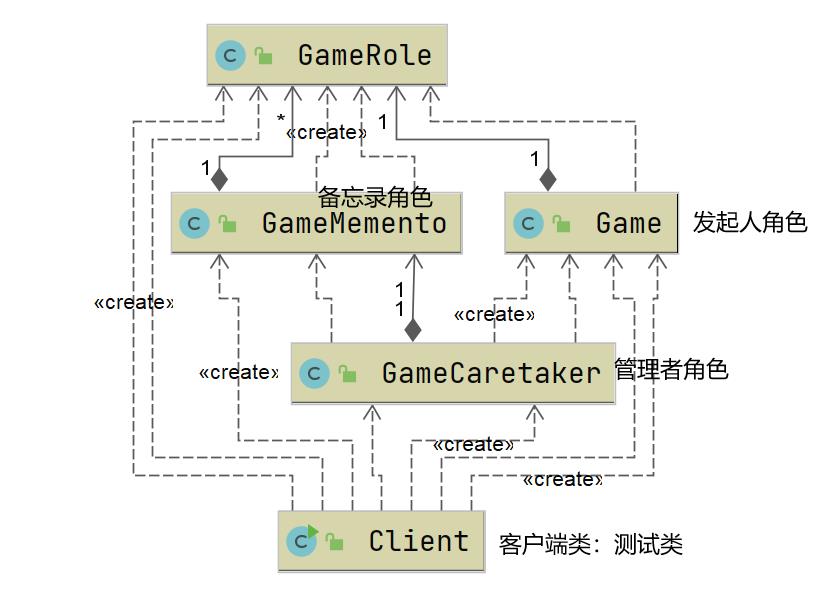设计模式 行为型模式 实例 -- 备忘录模式实例:游戏备忘录
Posted CodeJiao
tags:
篇首语:本文由小常识网(cha138.com)小编为大家整理,主要介绍了设计模式 行为型模式 实例 -- 备忘录模式实例:游戏备忘录相关的知识,希望对你有一定的参考价值。
01:设计模式 行为型模式 – 备忘录模式(定义、结构、优缺点 适用场景分析)
02:设计模式 行为型模式 – 备忘录模式 具体实例:游戏挑战BOSS
03:设计模式 行为型模式 实例 – 备忘录模式实例
1. 备忘录模式实例
1.1 需求:
玩孤胆枪手游戏时,主角有“武器”,“生命值”,“技能值”,
“防护值”等属性并即时显示,游戏“有当前进度值”,
玩家在游戏时随时可以保存游戏进度及从以前进度回复,
请用备忘录模式模拟这一过程。
1.2 类图分析:

1.3 代码实现:
1.3.1 GameRole
package ex09.memorandum;
/**
* ClassName: GameRole
* Description: 游戏角色类:发起人角色一个的属性
*
* @author Tianjiao
* @date 2021/11/22 17:04
*/
public class GameRole
// “武器”
private String weapon;
// “生命值”
private int lifeValue;
// “技能值”
private int skillValue;
// “防护值”
private int protectionValue;
public GameRole(String weapon, int lifeValue, int skillValue, int protectionValue)
this.weapon = weapon;
this.lifeValue = lifeValue;
this.skillValue = skillValue;
this.protectionValue = protectionValue;
public String getWeapon()
return weapon;
public void setWeapon(String weapon)
this.weapon = weapon;
public int getLifeValue()
return lifeValue;
public void setLifeValue(int lifeValue)
this.lifeValue = lifeValue;
public int getSkillValue()
return skillValue;
public void setSkillValue(int skillValue)
this.skillValue = skillValue;
public int getProtectionValue()
return protectionValue;
public void setProtectionValue(int protectionValue)
this.protectionValue = protectionValue;
@Override
public String toString()
return "[" +
"weapon='" + weapon + '\\'' +
", lifeValue=" + lifeValue +
", skillValue=" + skillValue +
", protectionValue=" + protectionValue +
']';
1.3.2 Game:发起人角色
package ex09.memorandum;
/**
* ClassName: Game
* Description: 游戏类:发起人角色
*
* @author Tianjiao
* @date 2021/11/22 17:15
*/
public class Game
// 游戏进度
private String gameProgress;
// 游戏角色
private GameRole gameRole;
public Game(String gameProgress, GameRole gameRole)
this.gameProgress = gameProgress;
this.gameRole = gameRole;
public Game saveState()
return this;
public void recoverState(Game roleStateMemento)
this.gameProgress = roleStateMemento.getGameProgress();
this.gameRole.setWeapon(roleStateMemento.getGameRole().getWeapon());
this.gameRole.setLifeValue(roleStateMemento.getGameRole().getLifeValue());
this.gameRole.setProtectionValue(roleStateMemento.getGameRole().getProtectionValue());
this.gameRole.setSkillValue(roleStateMemento.getGameRole().getSkillValue());
//恢复角色状态
public String getGameProgress()
return gameProgress;
public void setGameProgress(String gameProgress)
this.gameProgress = gameProgress;
public GameRole getGameRole()
return gameRole;
public void setGameRole(GameRole gameRole)
this.gameRole = gameRole;
@Override
public String toString()
return "[" +
"gameProgress='" + gameProgress + '\\'' +
", gameRole=" + gameRole.toString() +
']';
1.3.3 GameMemento :游戏备忘录角色
package ex09.memorandum;
import java.util.HashMap;
import java.util.Map;
/**
* ClassName: GameMemento
* Description: 游戏备忘录角色:可以记录游戏的进度和对象的游戏角色状态
*
* @author Tianjiao
* @date 2021/11/22 17:18
*/
public class GameMemento
private static final Map<String, GameRole> gameVersionMap = new HashMap();
public void addVersionState(String gameProgress, GameRole gameRole)
GameRole role = new GameRole(gameRole.getWeapon(), gameRole.getLifeValue(), gameRole.getSkillValue(), gameRole.getProtectionValue());
gameVersionMap.put(gameProgress, role);
public void deleteVersionState(String gameProgress)
gameVersionMap.remove(gameProgress);
public GameRole getVersionState(String gameProgress)
return gameVersionMap.get(gameProgress);
public void showVersions()
if (gameVersionMap.size() != 0)
for (Map.Entry<String, GameRole> entry : gameVersionMap.entrySet())
System.out.print("" + entry.getKey() + " : " + entry.getValue().toString() + "\\n");
else
System.out.println("对不起, 没有历史版本信息.");
1.3.4 GameCaretaker:管理者角色
package ex09.memorandum;
/**
* ClassName: GameCaretaker
* Description: 管理者角色:对备忘录进行管理, 提供保存于获取备忘录的功能
*
* @author Tianjiao
* @date 2021/11/22 17:19
*/
public class GameCaretaker
private final GameMemento gameMemento;
public GameCaretaker(GameMemento gameMemento)
this.gameMemento = gameMemento;
public void saveGameState(Game game)
this.gameMemento.addVersionState(game.getGameProgress(), game.getGameRole());
public Game getGameState(String gameProgress)
return new Game(gameProgress, this.gameMemento.getVersionState(gameProgress));
public void deleteGameState(String gameProgress)
this.gameMemento.deleteVersionState(gameProgress);
public void showVersions()
this.gameMemento.showVersions();
1.3.5 Client:客户端类
package ex09.memorandum;
/**
* ClassName: Client
* Description: 客户端类:测试类
*
* @author Tianjiao
* @date 2021/11/22 19:51
*/
public class Client
public static void main(String[] args)
// 创建游戏对象
GameRole gameRole = new GameRole("废铁刀", 100, 100, 100);
Game game = new Game("0.00%", gameRole);
// 创建管理者对象
GameCaretaker gameCaretaker = new GameCaretaker(new GameMemento());
// 1. 存储初始状态
gameCaretaker.saveGameState(game);
// 2. 第一次改变游戏状态
game.setGameProgress("27%");
gameRole.setWeapon("白银刀");
gameRole.setLifeValue(90);
gameRole.setSkillValue(90);
gameRole.setProtectionValue(90);
// 3. 存储第一次改变的状态
gameCaretaker.saveGameState(game);
// 4. 第二次改变游戏状态
game.setGameProgress("50%");
gameRole.setWeapon("黄金刀");
gameRole.setLifeValue(68);
gameRole.setSkillValue(68);
gameRole.setProtectionValue(68);
// 5. 存储第二次改变的状态
gameCaretaker.saveGameState(game);
// 6. 第三次改变状态
game.setGameProgress("63%");
gameRole.setWeapon("铂金刀");
gameRole.setLifeValue(56);
gameRole.setSkillValue(56);
gameRole.setProtectionValue(56);
// 7. 存储第三次改变游戏的状态
gameCaretaker.saveGameState(game);
// 打印当前的游戏状态
System.out.println("当前的游戏状态为:");
System.out.println(game.toString() + "\\n");
// 打印游戏版本信息
System.out.println("历代的游戏版本信息为:");
gameCaretaker.showVersions();
// 回到游戏进度为27%的版本
game.recoverState(gameCaretaker.getGameState("27%"));
// 打印当前的游戏状态
System.out.println("\\n当前的游戏状态为:");
System.out.println(game.toString() + "\\n");
// 回到游戏进度为63%的版本
game.recoverState(gameCaretaker.getGameState("63%"));
// 打印当前的游戏状态
System.out.println("当前的游戏状态为:");
System.out.println(game.toString() + "\\n");
1.3.6 运行结果:

以上是关于设计模式 行为型模式 实例 -- 备忘录模式实例:游戏备忘录的主要内容,如果未能解决你的问题,请参考以下文章